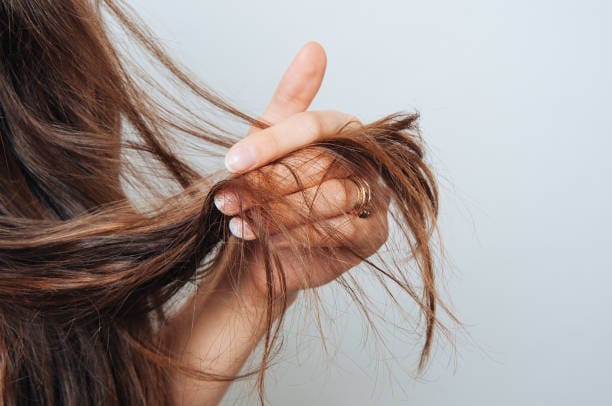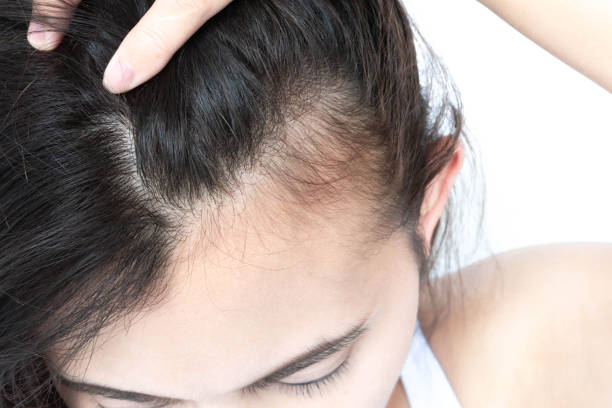Hyaluronic Acid For Hair

IS HYALURONIC ACID FOR HAIR WORTH THE HYPE?
We’ve talked about hyaluronic acid and retinol in the past. However, people have been noting a new use for the versatile ingredient: hyaluronic acid for hair. This idea has generated a ton of buzz online since a TikTok video about the topic went viral. And it seems to be living up to its lofty reputation. Writers, experts, and online testimony all highlight the efficacy of hyaluronic acid when it comes to hydrating their locks.
But there’s (understandably) plenty of questions when a TikTok trend gains traction. How safe is it? Does it actually work? How does it work on different hair types? What are the potential side effects? If you want to learn more about this emerging trend, you’ve come to the right place! We’ll answer all these questions and more.
HOW HYALURONIC ACID WORKS?
Hyaluronic acid is known best for its moisturizing qualities. The acid is a humectant, or a substance that draws or attracts water and retains it. Hyaluronic acid will even pull water from the air, especially in humid conditions. Because of this property, hyaluronic acid is great for dry skin. It’s a popular ingredient in lotions, face balms, moisturizers, and nail and skincare products.
Hyaluronic acid has far more benefits than just helping your skin. The powerful humectant may even help wounds to heal more quickly. This is because hyaluronic acid encourages new blood vessels to form and stimulates the production of collagen.
Now that we know more about the science of hyaluronic acid, we can dig into its uses and benefits for hair specifically.
IS HYALURONIC ACID GOOD FOR HAIR?
Yes, hyaluronic acid can replace dry, frizzy hair with smooth and hydrated hair. It will also help with flakiness and dryness on the scalp. If you have damaged hair and struggle to restore its old appearance and texture, hyaluronic acid can still help. Damaged hair is poorly equipped to rehydrate. The damage leaves the hair in a porous and brittle state.
Hyaluronic acid actually works to cut down on the porosity of damaged hair, hydrating it and sealing in the hydration. This helps to reverse the damage. Proponents of hyaluronic acid for hair also report smoother and softer hair.

HOW TO USE HYALURONIC ACID FOR HAIR?
Application will depend on the type of product you’re using. If applying a serum with hyaluronic acid, get your hair nice and wet first. For example, right after a bath or shower, apply the serum without drying your hair with a towel first. Remember that using too much hair serum can cause greasiness.
There are shampoos with hyaluronic acid for hair, but experts are torn on the idea. Some believe that hyaluronic acid needs time to work properly. Applying the ingredient only to immediately wash it off might not give you the effect you’re looking for. The most dramatic effect will likely come from hair masks, leave-in conditioners, serums, and other products that leave the hyaluronic acid in the hair.
How do you lock it in?
Now this is where hair oils come nicely. A lot of people are already using hair oils, but this is another great place for them because they can help lock in hyaluronic acid. I like argan, oil squalene oil, or jojoba oil. All of these are going to double their function to lock in the moisture that the hyaluronic acid brought to the hair.
Is Natural Hyaluronic Acid Better?
Yes, synthetic hyaluronic acid for hair can cause side effects such as itching and redness when applied to scalp and hair. Therefore, look for a natural, botanical hyaluronic acid for hair. Rose oil, gotu kola, and senna are good examples of plants that are very hydrating and good at retaining moisture. Look for the products containing these natural ingredients to make sure you don’t put any chemicals on your scalp.
Chemicals in hair products (shampoo, conditioners, dry shampoo, and many others) can build up on your scalp and cause allergic reactions such as itching, dryness, and even hair loss. Fragrances, botanicals, and surfactants are just a few of the common ingredients in shampoo, and they can all cause contact dermatitis.
CPG giant Unilever has recently recalled multiple dry shampoo products over cancer risk, according to FDA. They contained dangerous levels of carcinogen benzene and the reason why it was recalled was a class action lawsuit against the company. Therefore, make sure you avoid hair care products containing benzene or any other potentially harmful chemical. This particular chemical can cause leukemia and other blood disorders.
DOES HYALURONIC ACID PROMOTE HAIR GROWTH?
This has not been proven, no. Some users claim that their hair is thicker or longer since they started using hyaluronic acid. This may very well be the case because healthier and stronger hair grows faster. This is due to less breakage of the hair. What we know for sure is that the ingredient excels at promoting collagen and cell growth. But we simply don’t have the scientific studies to back this claim yet. Hopefully, the newfound popularity of hyaluronic acid for hair will prompt further research into its benefits for hair.
Testing It On DIVERSE HAIR TYPES
I’m happy to report that this nifty ingredient seems to work well for all hair types and textures. As a biracial woman with curly hair, I’ve tried my fair share of hair products over the years before finding something that worked well. I know it can be annoying to see rave reviews online and try it out yourself to lukewarm or even negative results. However, it seems that hyaluronic acid is one of those rare safe bets, performing positively on all types of hair.
What we can conclude from the trending videos is that it’s helping to condition people’s hair, make it feel softer, make it look smoother. It also is helping add some shine and all of that is really improving the appearance of the health of the hair. Also, it improves the appearance of split ends. It just makes it look healthier and fuller, and it is making it more manageable. Hyaluronic acid is actually hiding hair damage, it is really helping to improve the visual appearance of the hair.
POTENTIAL SIDE EFFECTS TO LOOK OUT FOR
There’s little to report here. Hyaluronic acid appears to be a safe ingredient, especially if you opt in for a natural alternative vs synthetic one. When it comes to hyaluronic acid supplements, there are some caveats. If you are pregnant, nursing, have cancer or a history of cancer, you will want to consult with your physician before taking the supplement. Hyaluronic acid does such a good job at encouraging cell growth that it may actually encourage the growth of cancer cells in individuals with cancer or a history of cancer.
With those few exceptions aside, there aren’t many side effects to look out for. Hyaluronic acid and vitamin c as well as hyaluronic acid and retinol tend to go well together, especially if you opt in for natural ingredients. Of course, it’s important to follow the instructions when applying a product with hyaluronic acid. Overuse of the ingredient could lead to greasiness or your ends drying out. It’s not confirmed that hyaluronic acid can dry out the ends of your hair, but some have speculated that it’s possible. When the humectant runs out of other sources to claim moisture, it could come after the moisture in the hair itself.
Environment may play a factor in efficacy. One source claimed that hyaluronic acid use for hair in places with dry air and little to no humidity would backfire. With no water in the air to absorb, the acid would absorb from you instead. Therefore, people living in dry climates may want to try a smaller amount first as an added precaution.
HAIR AND SKIN MOISTURE
Hair health is extremely important, but we shouldn’t neglect our skin health either. And what better way to complement your rejuvenated hair than with rejuvenated, brightened skin? That’s where Plant Mother’s Vitamin C and retinol serums come in. When crafting products, Plant Mother selects the most nutritious anti-aging ingredients to make your skin healthy, well-nourished, and rejuvenated. The serums act like a real “skin food.” There are no synthetic ingredients, or artificial components, and all serums are gluten-free.
FINAL THOUGHTS
I never thought I’d write this, but it seems like this DIY TikTok trend is safe and healthy. It turns out that hyaluronic acid is beneficial for both skin and hair. Even dermatologists agree. The effective ingredient attracts enough moisture to hydrate dry, frizzy, or damaged hair. It will seal up those hair cuticles and prevent the pores that stop your hair from keeping the moisture in.
And while it appears to have the most significant visible effect on dry or damaged hair, it can help any hair type in any condition. And if you’re researching natural hyaluronic acid for hair, be sure to check out Plant Mother vitamin C and retinol serum as well. We’ve got the natural ingredients needed to improve skin texture, even out skin tone, brighten the skin, promote collagen growth and encourage cell turnover.
MEDICAL DISCLAIMER
This content is for informational and educational purposes only. It is not intended to provide medical advice or to take the place of such advice or treatment from a personal physician. All readers of this content are advised to consult their doctors or qualified health professionals regarding specific health questions. The publisher of this content does not take responsibility for possible health consequences of any person or persons reading or following the information in this educational content. All viewers of this content, especially those taking prescription or over-the-counter medications, should consult their physicians before beginning any nutrition, supplement, skincare product, or lifestyle program.
